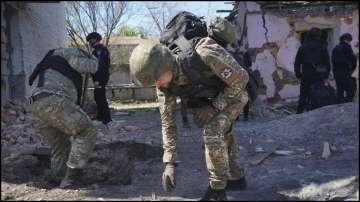What is Chloropicrin, the chemical warfare agent US accuses Russia of using on Ukrainian troops?
The US claims that Russia has violated the 1993 Chemical Weapons Convention (CWC) by using chloropicrin against Ukrainian troops. However, the Kremlin has denied the accusations and said that Russia is committed to obligations under international law.

Washington: The US Department of State has accused Russia of using chemical weapons in Ukraine, including the notorious choking agent called Chloropicrin, which is banned under an international chemical weapons ban. Washington alleges that Russia used chloropicrin against Ukrainian forces in violation of the 1993 Chemical Weapons Convention (CWC).
"The use of such chemicals is not an isolated incident, and is probably driven by Russian forces’ desire to dislodge Ukrainian forces from fortified positions and achieve tactical gains on the battlefield," the State Department wrote in a statement while announcing sanctions against three Russian government entities associated with its chemical and biological weapons programmes.
However, Russia has denied the US accusation that its forces in Ukraine violated an international ban on chemical weapons by using substances including the prohibited choking agent. Kremlin spokesman Dmitry Peskov told reporters that Moscow remained bound by its obligations under the treaty that bans chemical weapons.
"As always, such announcements are absolutely unfounded and are not supported by anything. Russia has been and remains committed to its obligations under international law in this area," Peskov said on the US allegations on Wednesday. Both the US and Ukraine have accused Russia of using riot control agents against Ukrainian troops
What is Chloropicrin?
Chloropicrin is listed as a banned choking agent by the Hague-based Organization for the Prohibition of Chemical Weapons (OPCW), which was created to implement and monitor compliance with the 1993 Chemical Weapons Convention (CWC). German forces fired the chemical agent against Allied troops during World War I in one of the first uses of a chemical weapon.
According to the US National Institutes of Health (NIH), chloropicrin appears as a slightly oily colourless to yellow liquid with a strong irritating odour. It is a severe toxic irritant that can cause immediate and severe inflammation of the eyes, nose and throat, and significant injuries to the upper and lower respiratory tract. Exposure to the chemical is mainly through inhalation, ingestion and the skin.
At high volumes, it can cause nausea and vomiting, however, it is not as toxic as other chemical weapons. When the Nazi German forces used it as a tear gas, Allied forces were forced to remove their masks to vomit during the First World War, exposing them to other, more toxic chemical weapons used during the war. As a result, chloropicrin has not been approved for use within the European Union.
Apart from a chemical warfare agent, chloropicrin is also used as a soil fumigant, particularly for strawberry crops. It is also used as a pesticide and when in contact with the skin, can cause blisters, difficulty in breathing, headache and bluish discolouration of the skin.
Russia's use of riot control agents
Earlier, the Ukrainian military said Russia has stepped up its illegal of use riot control agents as it presses its biggest advances in eastern Ukraine in more than two years. In addition to chloropicrin, Russian forces have used grenades loaded with CS and CN gases, the Ukrainian military says. It says at least 500 Ukrainian soldiers have been treated for exposure to toxic substances and one was killed by suffocating on tear gas.
While civilians usually can escape riot control gases during protests, soldiers stuck in trenches without gas masks must either flee under enemy fire or risk suffocating. Moscow's use of the gas "comes from the same playbook as its operations to poison" the late opposition leader Alexei Navalny in 2020 and Sergei Skripal and his daughter Yulia in 2018 with the Novichok nerve agent, the statement said.
Separately, the US Treasury imposed sanctions on three entities and two individuals involved in purchasing items for Russian military institutes involved in the country's chemical and biological weapons programs. The sanctions were among new measures announced by the United States on Wednesday targeting Russia over its 2022 full-scale invasion of Ukraine.
The CWC bans the production and use of chemical weapons. It also requires the 193 countries that have ratified the convention, which include Russia and the US, to destroy any stocks of banned chemicals. Russia and Ukraine have accused each other of breaching the treaty in OPCW meetings.
(with inputs from Reuters)
ALSO READ | US accuses Russia of using 'chemical weapons' in Ukraine, violating international ban